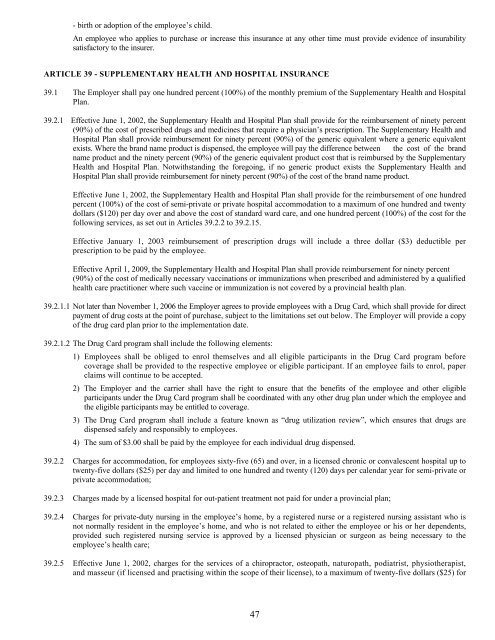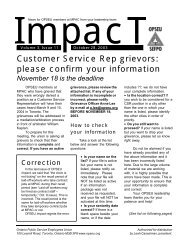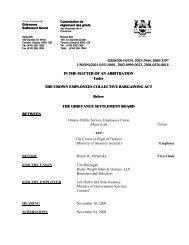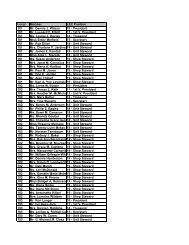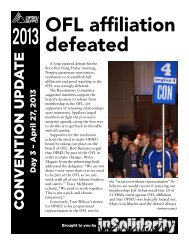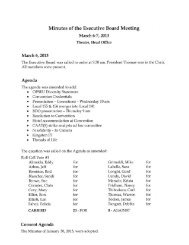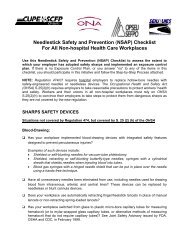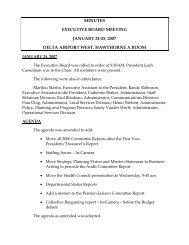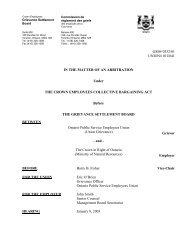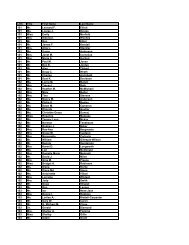COLLECTIVE AGREEMENTS - OPSEU
COLLECTIVE AGREEMENTS - OPSEU
COLLECTIVE AGREEMENTS - OPSEU
Create successful ePaper yourself
Turn your PDF publications into a flip-book with our unique Google optimized e-Paper software.
- birth or adoption of the employee’s child.<br />
An employee who applies to purchase or increase this insurance at any other time must provide evidence of insurability<br />
satisfactory to the insurer.<br />
ARTICLE 39 - SUPPLEMENTARY HEALTH AND HOSPITAL INSURANCE<br />
39.1 The Employer shall pay one hundred percent (100%) of the monthly premium of the Supplementary Health and Hospital<br />
Plan.<br />
39.2.1 Effective June 1, 2002, the Supplementary Health and Hospital Plan shall provide for the reimbursement of ninety percent<br />
(90%) of the cost of prescribed drugs and medicines that require a physician’s prescription. The Supplementary Health and<br />
Hospital Plan shall provide reimbursement for ninety percent (90%) of the generic equivalent where a generic equivalent<br />
exists. Where the brand name product is dispensed, the employee will pay the difference between the cost of the brand<br />
name product and the ninety percent (90%) of the generic equivalent product cost that is reimbursed by the Supplementary<br />
Health and Hospital Plan. Notwithstanding the foregoing, if no generic product exists the Supplementary Health and<br />
Hospital Plan shall provide reimbursement for ninety percent (90%) of the cost of the brand name product.<br />
Effective June 1, 2002, the Supplementary Health and Hospital Plan shall provide for the reimbursement of one hundred<br />
percent (100%) of the cost of semi-private or private hospital accommodation to a maximum of one hundred and twenty<br />
dollars ($120) per day over and above the cost of standard ward care, and one hundred percent (100%) of the cost for the<br />
following services, as set out in Articles 39.2.2 to 39.2.15.<br />
Effective January 1, 2003 reimbursement of prescription drugs will include a three dollar ($3) deductible per<br />
prescription to be paid by the employee.<br />
Effective April 1, 2009, the Supplementary Health and Hospital Plan shall provide reimbursement for ninety percent<br />
(90%) of the cost of medically necessary vaccinations or immunizations when prescribed and administered by a qualified<br />
health care practitioner where such vaccine or immunization is not covered by a provincial health plan.<br />
39.2.1.1 Not later than November 1, 2006 the Employer agrees to provide employees with a Drug Card, which shall provide for direct<br />
payment of drug costs at the point of purchase, subject to the limitations set out below. The Employer will provide a copy<br />
of the drug card plan prior to the implementation date.<br />
39.2.1.2 The Drug Card program shall include the following elements:<br />
1) Employees shall be obliged to enrol themselves and all eligible participants in the Drug Card program before<br />
coverage shall be provided to the respective employee or eligible participant. If an employee fails to enrol, paper<br />
claims will continue to be accepted.<br />
2) The Employer and the carrier shall have the right to ensure that the benefits of the employee and other eligible<br />
participants under the Drug Card program shall be coordinated with any other drug plan under which the employee and<br />
the eligible participants may be entitled to coverage.<br />
3) The Drug Card program shall include a feature known as “drug utilization review”, which ensures that drugs are<br />
dispensed safely and responsibly to employees.<br />
4) The sum of $3.00 shall be paid by the employee for each individual drug dispensed.<br />
39.2.2 Charges for accommodation, for employees sixty-five (65) and over, in a licensed chronic or convalescent hospital up to<br />
twenty-five dollars ($25) per day and limited to one hundred and twenty (120) days per calendar year for semi-private or<br />
private accommodation;<br />
39.2.3 Charges made by a licensed hospital for out-patient treatment not paid for under a provincial plan;<br />
39.2.4 Charges for private-duty nursing in the employee’s home, by a registered nurse or a registered nursing assistant who is<br />
not normally resident in the employee’s home, and who is not related to either the employee or his or her dependents,<br />
provided such registered nursing service is approved by a licensed physician or surgeon as being necessary to the<br />
employee’s health care;<br />
39.2.5 Effective June 1, 2002, charges for the services of a chiropractor, osteopath, naturopath, podiatrist, physiotherapist,<br />
and masseur (if licensed and practising within the scope of their license), to a maximum of twenty-five dollars ($25) for<br />
47


